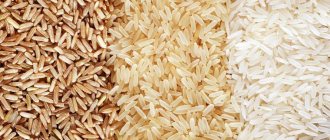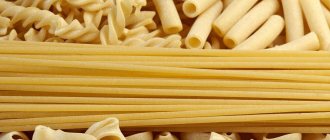What is the composition of melon?
Melon is a healthy food due to its rich composition of vitamins and minerals. Below is the amount of useful substances contained in 100 g of melon.
Composition of melon
- Vitamin A – 67 mg;
- Vitamin C – 20 mg;
- Vitamin B1 – 0.4 mg;
- Vitamin B2 – 0.4 mg;
- Vitamin B6 – 0.06 mg;
- Vitamin E – 0.1 mg;
- Vitamin PP – 0.4 mg;
- Potassium – 118 mg;
- Silicon – 82 mg;
- Chlorine – 49 mg;
- Sodium – 31 mg;
- Calcium – 15 mg;
- Magnesium – 13 mg;
- Phosphorus – 11.5 mg;
- Zinc – 90 mcg;
- Copper 47 mcg;
- Manganese – 37 mcg;
Also, 100 grams of product contain 0.3 g of fat, 0.6 g of protein and 7.4 g of carbohydrates. If we take averages, then 100 g of melon contains approximately 35 kcal. But this is an approximate number, because the calorie content of melon depends on its variety.
Beneficial features
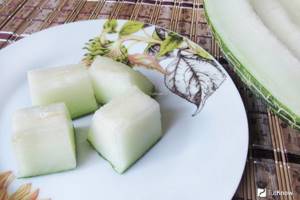
Fragrant, tender melon is valued not only for its unsurpassed taste. It is useful in dietary nutrition for diseases of the cardiovascular system, constipation, anemia, kidney disease, liver disease, gout, rheumatism, hemorrhoids, urolithiasis and cholelithiasis. As we saw above, melon has a unique chemical composition, therefore it is considered one of the best healthy products:
- The pulp contains substances that promote the production of the “happiness hormone” - serotonin. Hence the widespread belief about the ability of melon to eliminate nervous stress and depression. So, don’t be sad, eat a couple of pieces of these delicious fruits and everything will be in order!
- Silicon has a positive effect on the regulation of physiological processes. It affects the structure of hair and skin, the functioning of the cerebral cortex, and is necessary for the full functioning of the nervous system, internal organs and gastrointestinal tract (gastrointestinal tract).
- Melon, compared to other melon crops, has enormous benefits - after all, it is a champion in the amount of vitamin C. “Ascorbic acid” has a beneficial effect on the intestinal flora, helps quickly remove cholesterol from the human body, improves the digestive process, and also makes our body invulnerable during the period winter cold.
- Women: Folic acid, which is destroyed by cooking, is retained in melon because we eat it fresh. It is extremely important due to its beneficial properties for women during menopause and pregnancy.
- For men: Melon seeds have long been believed to be a powerful aphrodisiac. They can improve male strength. They are consumed fresh, preferably with honey (but not more than 2 g per day, in order to avoid problems with the spleen).
- The benefits of melon are due to the large amount of fiber, so in modern medicine it is used to cleanse the intestines. Melon fibers help eliminate radioactive substances and heavy metal salts from the body, but in some cases they can be harmful (see below).
It has found wide application in cosmetology: masks are prepared from it for the skin of the face and body, and hair.
In weight loss methods, one of the most popular diets is the “melon” diet. In the East, there is a belief that melon gives youth to the whole body, makes men strong and women beautiful. Video about the benefits of melon:
[media=
https://youtu.be/F-I6KLGgFg4
]
How many calories do melons of different preparations have?
Also check out these articles
- Rhode Island chicken breed
- Kuibyshev breed of sheep
- How to plant and care for dill
- Why do orchid leaves turn yellow?
Dried melon
Thanks to such a low calorie content, melon is indispensable in diets with increased weight. Due to the presence of natural sugar and plenty of water, this product allows you to remain full for a long time after consuming it. But in what form is it better to eat melon? The above indicator applies exclusively to a fresh product; during processing, the calorie content of melon can change the calorie content.
They eat it fresh, in salads, in the form of jam, jam, juice, desserts, and ice cream. There are also dried melons, healthy and tasty, but they contain much more sugar than the fresh product. Below is a table of caloric content of melons after processing.
| Melon product or dish | Calorie content (in kcal/100 g) |
| Fresh | 35 |
| Dried | 340,79 |
| Dried | 341 |
| Canned | 33 |
| Jam | 169,66 |
| Juice | 47 |
| Candied fruit | 282,67 |
| Melon seeds | 555 |
| Frozen | 34 |
| Melon oil | 899 |
As you can see, the calorie content of melon largely depends on the form in which it is consumed. For people on diets, only fresh, frozen, canned melons and juices are useful, unless there are any contraindications.
Basic principles of proper nutrition
Proper nutrition is not about dieting or endless calorie counting. This, in contrast to a diet, is a complete diet, which includes only useful and healthy foods and dishes that provide the human body with all the necessary substances.
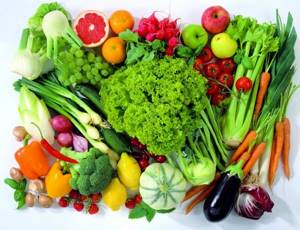
Proper nutrition
Note! With proper nutrition, you do not need to strictly limit yourself in food. You will only have to refuse frankly harmful products. You need to remove from your diet sweets, baked goods, fast food, sweet sodas, semi-finished products - everything that clutters the body with completely unnecessary calories, without adding anything useful.
When switching to proper nutrition, you should:
- refuse or reduce as much as possible fried, salted, canned, smoked foods;
- give up sweets. Natural marshmallows, marshmallows, and marmalade are acceptable, but it is better to treat yourself to sweet fruits (but do not overuse grapes and bananas);
- be sure to include a sufficient amount of animal protein in your diet: it is advisable to eat meat and fish boiled or steamed;
- consume fresh vegetables and fruits daily;
- do not forget about saturated fatty acids (Omega 3). They are rich in vegetable oils, nuts, red fish;
- It is advisable to consume porridge daily as a source of fiber and B vitamins;
- Be sure to drink clean water (not tea, not compote, not juice) in sufficient volume.
Calorie content of Torpedo melon per 100 grams
Torpedo melon has elongated light yellow fruits, sometimes the skin has a greenish tint with a medium-density mesh. This variety is very common in Russia, Ukraine and neighboring countries.
Melon Torpedo
100 grams of Torpedo melon contain only 35.59 kcal, which makes the variety a good component of any diet. The indicated amount of calories is on average 1.7% of the daily value for the average person. The weight of one Torpedo melon usually ranges from 5 kg and one such melon contains 1750 kcal, which is quite a bit compared to other sweet fruits.
Advice from nutritionists
Cucumber smoothie for weight loss
If you want to eat melon and not gain weight and not experience any negative effects on the body, then you should pay attention to the advice of nutritionists:
- It is necessary to eat melon separately from other products, because it cannot be combined with other foods, and consumption together with alcohol or dairy products can even cause digestive upset;
- You should not eat melon on an empty stomach, it is better to eat it as a dessert, but not earlier than 15 minutes after the main meal;
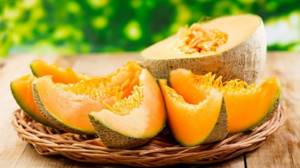
You shouldn't eat melon on an empty stomach
- late evening and night are not the best time to eat melon, because it puts quite a strain on the digestive system and kidneys, so it is optimal to eat melon for breakfast or throughout the day;
- due to its calories, melon for dinner in the evening is acceptable, but it should be remembered that the evening meal in this case should be 2-3 hours before bedtime, and you should not eat or drink anything else;
- you should eat no more than 1-1.5 kg per day, and the daily dose should be divided into several doses;
- The only danger for those losing weight is dried melon pulp and its seeds - these are very high-calorie foods (334 and 555 calories, respectively), but fresh or frozen melon pulp, as well as melon juice, are safe for the figure;
- fasting days with melon can be carried out once a week: divide 1.5 kg of melon into 5-7 doses, drink only still mineral water or green tea;
- melon mono-diets are also acceptable. Their duration is 2-7 days. You can lose up to 5 kg on such a diet;
- Watermelon has approximately the same effect for weight loss, so if desired, instead of melon, you can consume watermelon or both melons;
- When drying the body, you should not eat melon and watermelon.
The usefulness of melon is obvious; nutritionists agree that this product is acceptable and very effective for those who want to lose weight. The main thing is to follow the recommendations for consuming sweet treats, and then no troubles will happen to the body.
Calorie content of Kolkhoznitsa melon per 100 grams
We recommend reading our other articles
- When to plant cabbage seedlings in 2021
- Canned cucumbers
- What edible mushrooms can be collected in the Moscow region
- Radish Zhara description and characteristics of the variety
Melon Kolkhoznitsa is the second most common variety. It has a pleasant, sweet taste and is unpretentious to grow, so it is often planted for personal use, and not just for sale.
Melon Kolkhoznitsa
The calorie content of melon in 100 g is only 30.81 kcal. This is slightly less than that of the Torpedo variety, so this variety is even healthier to eat during diets, but do not forget that it is less sweet. There is not much sugar in it, and although it is tasty, it is still inferior in taste to the Torpedo variety.
How to choose:
- It’s easy to identify a good melon in a market or store: first of all, look at the diameter of the stem, which should be thick. Press the peel on the other side of the stem - if the fruit is not ripe, the peel will be hard and will not yield to pressure.
- Smell also plays a big role: don't be shy about smelling the melon. When ripe, it should exude a subtle, delicate and sweet melon aroma with notes of honey, vanilla and even pear and pineapple. The warmer the room where it is sold, the stronger the smell will be. If it doesn’t smell like anything, a lot of hormones were used during cultivation, which will only be harmful to health. But if the fruit is overripe, it will smell like decay.
- Unlike watermelon, its peel is not so dense, so integrity is an important criterion here: no cracks, stains or dents. After all, on damaged vegetables, pathogenic bacteria spread very quickly, penetrating through the thin peel. Therefore, be careful not to encounter botulism or salmonellosis later.
- Due to the high percentage of sugars, cut fruits become an ideal environment for the proliferation of pathogenic microorganisms. Melons are also wrapped in cling film (in the supermarket), which ultimately reduces their beneficial properties. Who can guarantee the cleanliness of the seller’s knife and hands?
- As for the definition of varieties, “Kolkhoznitsa” has a smooth surface, “Torpedo” has a rough surface, with furrows, it also looks more elongated and larger compared to the round and rich yellow melon variety “Kolkhoznitsa”.
- When is melon season? Good quality vegetables are usually sold from August 15 to September 20. Although Central Asian fruits may appear earlier. It is believed that the best are later ripening periods, when vegetables are not grown using film coverings and do not use pesticides.
Video on how to choose the right melon, tips:
What is the calorie content of different types of melons?
The calorie content of the two most popular melon varieties that can be found on the market and in stores was described above. But what about other varieties? Increasingly, overseas wonders appear on the shelves, striking with their color, shape, unusual peel or pulp. There are many people who want to try foreign fruits, but are they really that useful, especially when dieting?
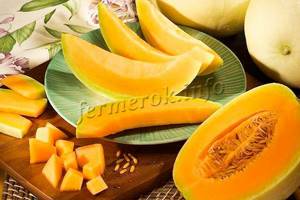
Melon Cantaloupe
- Cantaloupe (Thai) 38-51 kcal;
- Honey Dew – 38 kcal;
- Galia – 30-38 kcal;
- Piel de Sapo – 36 kcal;
- Nutmeg – 36 kcal;
- Honey – 33 kcal;
- Charente – 31 kcal;
- Kassaba – 28 kcal;
Energy Diet Smart cocktails
Energy Diet Smart is a simple but very effective version of the cocktail, which contains everything you need for a balanced and nutritious diet without calories, i.e. i.e. for those who want to lose weight.
- A complex of plant and animal proteins is a valuable source of essential and essential amino acids that we need for health, immunity, and youth. It is a building material that any cell in the body cannot do without. Proteins normalize brain function, restore hormonal levels and enzyme synthesis.
- Plant enzymes - help digestion, strengthen the immune system, and prevent the accumulation of fat deposits.
- Fast and slow carbohydrates provide an excellent boost of energy and keep you feeling full for a long time.
- Phospholipids (organic complex fats) - help restore damaged cells, delay aging, improve memory and prevent the accumulation of fat deposits.
Interesting Facts
The calorie content of melon is very low when compared to other fruits. This is an interesting fruit with many interesting facts associated with it.
For vegetarians, melon is a must-have fruit.
- Melons are recommended to be included in the diet when losing weight, during a drinking detox diet, during blood type diets, salt-free diets, and for those who follow the daily norm of KBJU.
- Cantaloupe is considered the highest calorie variety of melon. According to various sources, its calorie content is 38-51 kcal.
- Melon is used in the treatment of nervous system disorders.
- Increasing the amount of melon in a person’s diet reduces the risk of heart disease, obesity, improves the condition of the skin and hair, and increases body tone.
- For vegetarians, melon is a must-have fruit that should be eaten at least once a week.
Is there any harm?
For some chronic diseases, it is prohibited to use melon for food. For example, if you have gastritis and ulcers, you cannot eat such a product; melon can provoke an exacerbation of diseases. You should not consume this melon crop if you have diseases of the pancreas, kidneys or gall bladder.
Diabetics and people with pre-diabetes should use melon with caution.
Melon is a fruit that is quite sweet and contains a large amount of glucose. Uncontrolled consumption of the fetus can lead to hypervitaminosis and also provoke the development of cardiovascular diseases. The watery pulp can have a laxative and diuretic effect, so it is better not to eat melon at night.
Reviews
People's reviews about the melon diet:

Alexandrova Anastasia
Nutrition and healthy lifestyle specialist and author of myfitnesblog.com. For many years, she has successfully helped women and men lose weight and maintain a beautiful figure.





